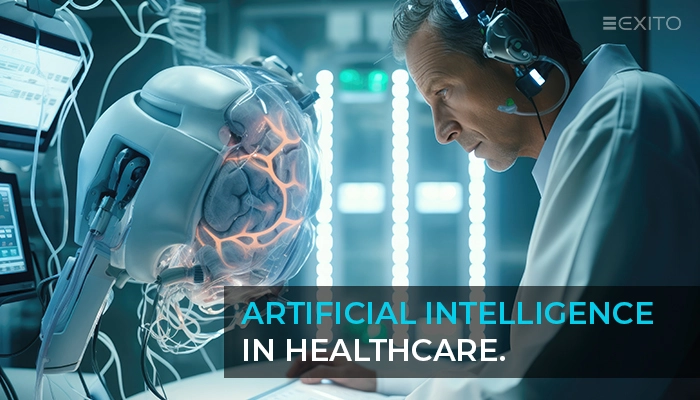Introduction:
In today’s rapidly evolving era of healthcare, the integration of Artificial Intelligence in healthcare processes has become a vital part, that it is capable of reshaping the Medical Industry. To give you a clear picture, a future where administrative tasks seamlessly fade away, diagnosis of diseases becomes more accurate, and the discovery of effective drugs accelerates at a pace faster than ever before.
This is artificial intelligence! The use of AI in the medical field is not just mere fiction, but it’s an invention that will revolutionize healthcare in the days to come.
Here are 5 ways to revolution the Healthcare Industry with AI
Reduced Administrative Burden:
Healthcare professionals are always in dire need of an assistant that can help with all the mountain-like pile of paperwork and administrative tasks. That’s where generative AI and other relevant AI tools like virtual agents and Chatbots come into the picture by streamlining administrative processes such as scheduling, referral management, and test authorizations. This not only reduces time consumption but also contributes to better patient care.
Augmented Decision Support:
In the complex world of Medical Diagnosis and Treatment, AI truly serves as an ally, constantly providing decision support to frontline Healthcare professionals. Through Machine Learning algorithms and advanced Healthcare Analytics, AI has proved to be able to analyze vast amounts of patient data, enabling professionals to obtain evidence-based data that is accurate and precise. In this way, the cognitive load of the professionals decreases while simultaneously improving the Diagnosis and Treatment of ailments.
Smart Health Records:
The Digitization of health records is an area where Medical AI excels. Data management in healthcare can be a hassle and to tackle that very obstacle, Machine Learning algorithms are stepping in. It addresses these algorithms by automating document classification and the tedious data entry processes. Through AI-powered solutions like Google’s Cloud Vision API and MIT’s smart health records, data management is no more a task but a quick execution, which is achieved solely through the smart practices incorporated by artificial intelligence in healthcare.
Precision Analytics for Pathology Images:
Without pathology, in-depth healthcare diagnostics would not be possible. It’s the pathology results that influence the vast majority of clinical decisions.
Artificial intelligence-driven analytics are revolutionizing pathology by impacting a diverse set of clinical decisions. It ensures precise analysis of digital images even at the pixel level, that is what emerging technology can do!
Such in-depth analysis is what allows the identification of even the slightest of nuances that may disrupt the human eyes, that eventually results in accurate diagnoses and personalized treatment techniques.
Moreover, AI makes it extremely seamless by pre-screening slides and shifting the focus of the pathologist’s to areas that require immediate attention.
Drug Discovery and Development:
The process of drug discovery, predicting drug efficacy, and navigating the entire approval process is undoubtedly challenging. However, medical AI has revolutionized this journey.
By analyzing vast patient datasets and Genetic information, Artificial Intelligence can seamlessly identify potential drug targets with higher success rates compared to those of the traditional methods. Researchers can easily pinpoint specific Biological molecules that prove to be a cause of disease development.
This not only improves the drug discovery process but also reduces unnecessary costs associated with healthcare, for patients across the world.
Patient Experience:
Emerging technology in healthcare has extended beyond optimizing processes —It immensely enhances Customer Experience. AI-driven solutions offer the most seamless and Effective journey for patients, from scheduling appointments to planning treatments, providing an end-to-end support system.
I believe we can all agree when we say appointment scheduling is a source of frustration for many, but with AI-powered systems, this task has been streamlined. These systems take into account factors like patient preferences, provider availability, and clinic resources, thereby reducing waiting time and improving overall satisfaction.
The smart AI chatbots improve engagement and empowerment by being accessible 24/7, addressing patient inquiries, offering medical guidance, and providing support based on medical records and clinical guidelines. This uplifts any burden on healthcare providers and enables patients to make informed decisions on time.
AI Governance in Healthcare:
As AI becomes prevalent in clinical settings, establishing governance is crucial to ensure ethical use and patient safety. Issues like bias, transparency, privacy, and liability require attention and cannot be ignored.
Laura Craft, VP Analyst at Gardner, stresses the need for common rules and guidelines. The World Health Organization (WHO) addresses these concerns in its “Ethics & Governance of Artificial Intelligence for Health” report.
The report outlines six principles:
1. Protecting autonomy
2. Promoting human safety
3. Ensuring transparency
4. Fostering accountability
5. Ensuring equity
6. Promoting sustainable tools
In summary, AI enhances patient experience through streamlined processes and personalized care. However, medical AI should co-exist with ethical and regulatory considerations. Because advanced healthcare practices should be delivered only while upholding patient safety and rights.
Conclusion:
The integration of Artificial Intelligence (AI) in healthcare, leveraging generative AI, machine learning, and healthcare analytics, represents a transformative force in the medical field. This emerging technology holds the promise of giving healthcare operations a new face by reducing mundane administrative burdens to enhancing decision support for medical professionals.
However, as AI continues to expand its footprint in the medical landscape, ethical considerations and governance frameworks, such as those outlined by the World Health Organization.



